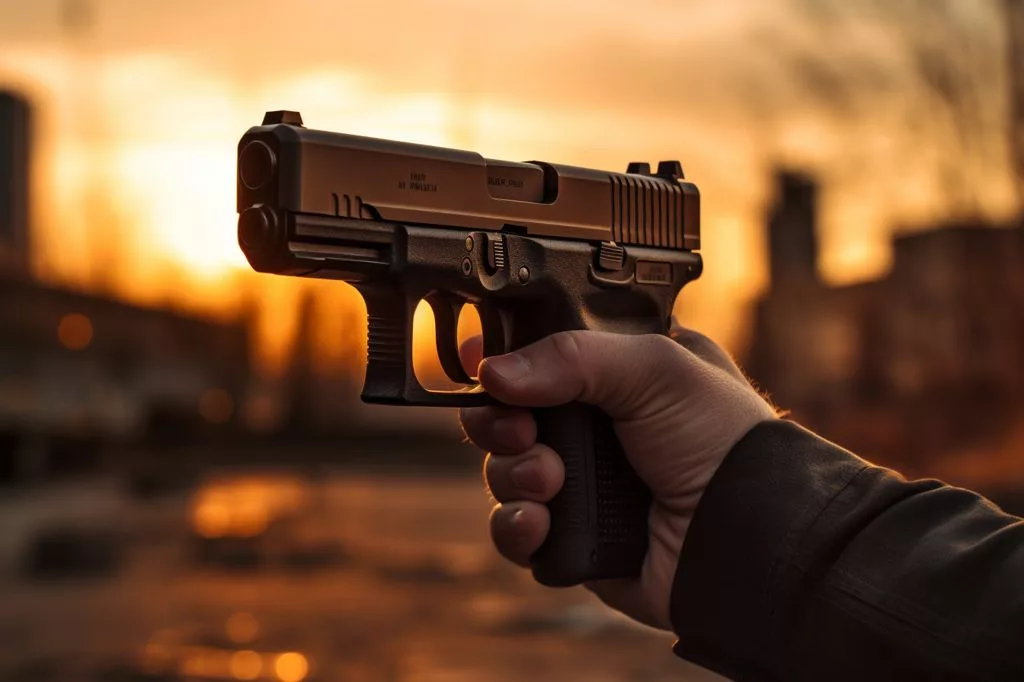LEAP officers in the Western Cape seized 28 unlawful firearms from various communities and arrested 1,068 suspects for a spectrum of crimes. The initiative relies on the tactically positioning of officers in high-crime locations, reinforced by data-guided planning and performance assessment, and has successfully removed a total of 471 illegal firearms from circulation since its establishment. The officers cooperate with various law enforcement agencies and stakeholders to establish safer, more dignified living conditions for residents.
How many firearms were seized by LEAP officers in the Western Cape?
LEAP officers in the Western Cape seized 28 unlawful firearms from various communities during a month-long operation. Since the establishment of the initiative, 471 illegal firearms have been removed from circulation.
A Month of Triumph: Seizing Illegal Firearms and Apprehending Suspects
In the ongoing war against crime, the Western Cape Police Oversight and Community Safety’s Law Enforcement Advancement Plan (LEAP) officers possess a formidable force: unwavering resolve. Between 4 September and 1 October 2023, these steadfast champions of justice have eliminated 28 unlawful firearms from a variety of communities throughout the Western Cape. Simultaneously, they arrested an incredible 1,068 suspects for a spectrum of crimes.
LEAP, a collaborative venture of the Western Cape Government (WCG) and the City of Cape Town (CoCT), originated from the Western Cape Safety Plan (WCSP). The initiative’s accomplishments rely on the tactically positioning of officers in high-crime locations, reinforced by data-guided planning and performance assessment. This evidence-centered methodology supports ongoing enhancement, ensuring the program remains focused on its ambitious objective: to reduce the murder rate by half by 2029.
Throughout the month-long operation, LEAP officers seized a variety of firearms, such as pistols, revolvers, and zip guns. These weapons were recovered in communities like Bishop Lavis, Manenberg, Khayelitsha, Mfuleni, Kraaifontein, Harare, Delft, Samora Machel, Nyanga, and Mitchells Plain. Since LEAP’s establishment, the initiative has successfully removed a remarkable total of 471 illegal firearms from circulation.
Multiple Arrests and the Importance of Firearm Confiscation
Apart from confiscating weapons, the officers also made numerous arrests. Charges brought against suspects included possession of illegal firearms (30 cases), possession of imitation firearms (17), possession of dangerous weapons (88), drug possession (641), and drug dealing (24). The success of these operations emphasizes the crucial role LEAP officers play in safeguarding communities.
Reagen Allen, Western Cape Minister of Police Oversight and Community Safety, stressed the significance of firearm confiscations in curbing violent crime. He acknowledged that firearms continue to be the primary weapon utilized by criminals in perpetrating heinous acts. The recent spike in fatal shootings, documented during September and early October, highlights the pressing need to tackle this issue.
Fighting Crime Collaboratively: LEAP Officers and Partnering Agencies
LEAP officers serve in the Western Cape’s top 10 murder locations, including Delft, Gugulethu, Harare, Khayelitsha (Site B policing precinct), Kraaifontein, Mfuleni, Mitchells Plain, Nyanga, Philippi East, and Samora Machel. They also offer vital support in other high-crime areas, such as Atlantis, Bishop Lavis, Hanover Park, Lavender Hill, Steenberg, and Grassy Park.
This comprehensive crime-fighting network extends beyond the LEAP initiative. Officers cooperate with various law enforcement agencies, including other City of Cape Town Law Enforcement teams, the South African Police Service (SAPS), neighborhood watches (NHWs), Community Policing Forums (CPFs), and numerous other stakeholders.
Recognizing the challenging conditions in which LEAP officers work, Minister Reagen Allen expressed appreciation for their unwavering dedication: “As the Western Cape Government, we will continue to support our LEAP officers, as through their interventions with various stakeholders, they are ensuring that we work towards our goal which is to halve the murder rate by 2029.” He also encouraged community members to support the officers in their relentless efforts to establish safer, more dignified living conditions for residents.
The Lasting Impact of Collaborative, Data-driven Law Enforcement
LEAP program’s recent accomplishments stand as a testament to the effectiveness of cooperative, data-informed law enforcement initiatives. By joining forces and employing innovative strategies, the Western Cape Police Oversight and Community Safety, alongside their dedicated LEAP officers and partners, persist in making considerable progress in the ongoing struggle against crime.
1. What is the Law Enforcement Advancement Plan (LEAP)?
LEAP is an initiative of the Western Cape Government (WCG) and the City of Cape Town (CoCT) that aims to reduce the murder rate by half by 2029. It relies on the tactically positioning of officers in high-crime locations, reinforced by data-guided planning and performance assessment.
2. How many suspects were arrested by LEAP officers in the Western Cape during the operation?
LEAP officers in the Western Cape arrested 1,068 suspects for a spectrum of crimes during a month-long operation.
3. What types of firearms were seized by LEAP officers in the Western Cape?
LEAP officers seized a variety of firearms, such as pistols, revolvers, and zip guns, from various communities in the Western Cape.
4. How many illegal firearms have been removed from circulation since the establishment of LEAP?
Since the establishment of LEAP, the initiative has successfully removed a total of 471 illegal firearms from circulation.
5. What charges were brought against suspects arrested by LEAP officers?
Charges brought against suspects included possession of illegal firearms, possession of imitation firearms, possession of dangerous weapons, drug possession, and drug dealing.
6. What is the significance of firearm confiscations in curbing violent crime?
Firearms continue to be the primary weapon utilized by criminals in perpetrating heinous acts. The confiscation of firearms by law enforcement agencies plays a crucial role in curbing violent crime.
7. What law enforcement agencies and stakeholders do LEAP officers cooperate with?
LEAP officers cooperate with various law enforcement agencies, including other City of Cape Town Law Enforcement teams, the South African Police Service (SAPS), neighborhood watches (NHWs), Community Policing Forums (CPFs), and numerous other stakeholders.
8. How do LEAP officers work towards establishing safer, more dignified living conditions for residents?
LEAP officers work towards establishing safer, more dignified living conditions for residents by conducting operations to remove illegal firearms from circulation, making numerous arrests, and cooperating with various law enforcement agencies and stakeholders.








